Mindfulness meditation practices can significantly alleviate symptoms of rare diseases by promoting relaxation and reducing stress. This article explores effective techniques like breath awareness and body scanning, shares personal journeys that enhance engagement, examines demographic influences on practice, and highlights long-term mental health benefits. Additionally, it provides resources for those interested in incorporating mindfulness into their symptom management strategies.
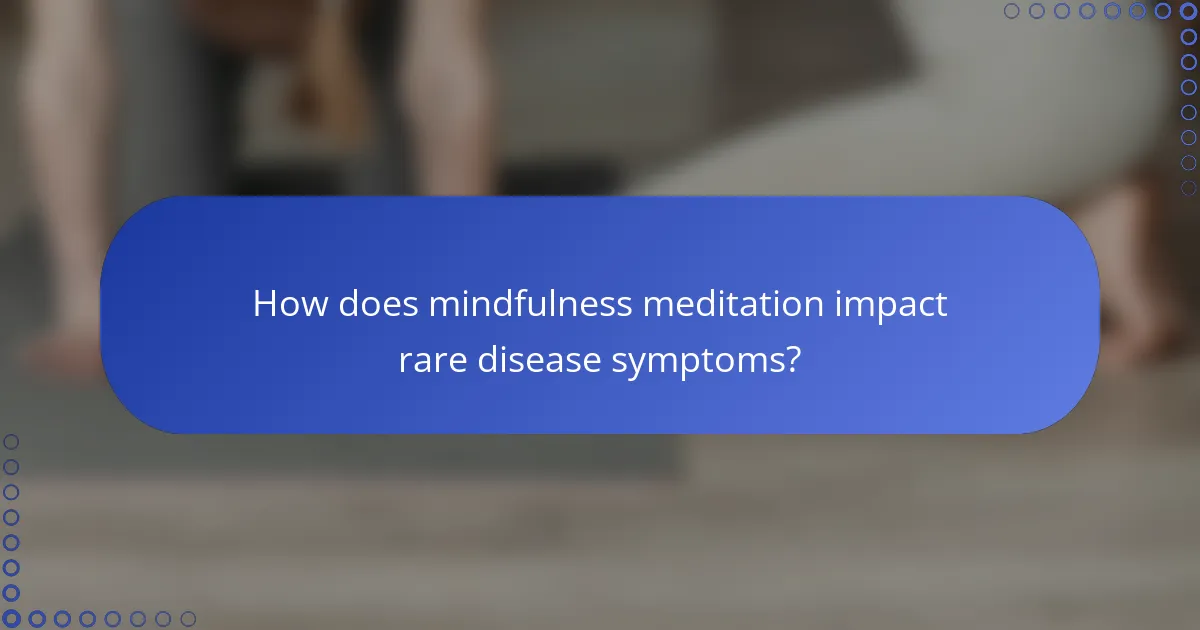
How does mindfulness meditation impact rare disease symptoms?
Mindfulness meditation can alleviate symptoms of rare diseases by promoting relaxation and reducing stress. Several studies indicate that mindfulness practices lead to improved emotional well-being and pain management. For instance, patients with rare autoimmune disorders reported decreased anxiety and enhanced coping strategies after engaging in regular mindfulness sessions. These practices can foster a sense of control over symptoms, ultimately improving quality of life.
What are the physiological effects of mindfulness meditation on the body?
Mindfulness meditation positively affects the body by reducing stress, lowering blood pressure, and enhancing immune function. These physiological changes stem from improved emotional regulation and increased awareness. Studies show that regular practice can lead to a decrease in inflammation markers, promoting overall health. Additionally, mindfulness meditation can alleviate symptoms associated with rare diseases by fostering a sense of control and well-being, which may enhance coping mechanisms.
Which rare diseases have shown improvement through meditation practices?
Mindfulness meditation practices have shown improvement in symptoms of several rare diseases. Conditions such as fibromyalgia, chronic fatigue syndrome, and rare autoimmune disorders have reported benefits. For example, patients with fibromyalgia experienced reduced pain and anxiety through regular meditation. Chronic fatigue syndrome sufferers noted improved energy levels and overall well-being. Additionally, individuals with rare autoimmune conditions found relief from stress and inflammation, enhancing their quality of life. Meditation serves as a complementary approach, supporting traditional treatments and fostering resilience in managing these challenging diseases.
How can mindfulness meditation complement traditional treatments for rare diseases?
Mindfulness meditation can enhance traditional treatments for rare diseases by reducing stress and improving emotional well-being. It fosters a holistic approach to health, helping patients manage symptoms more effectively. Research indicates that mindfulness practices can lead to improved quality of life and better coping strategies. For instance, patients with chronic conditions often report decreased anxiety and enhanced focus through regular meditation. This complementary method supports the overall treatment plan, addressing both physical and mental health aspects.
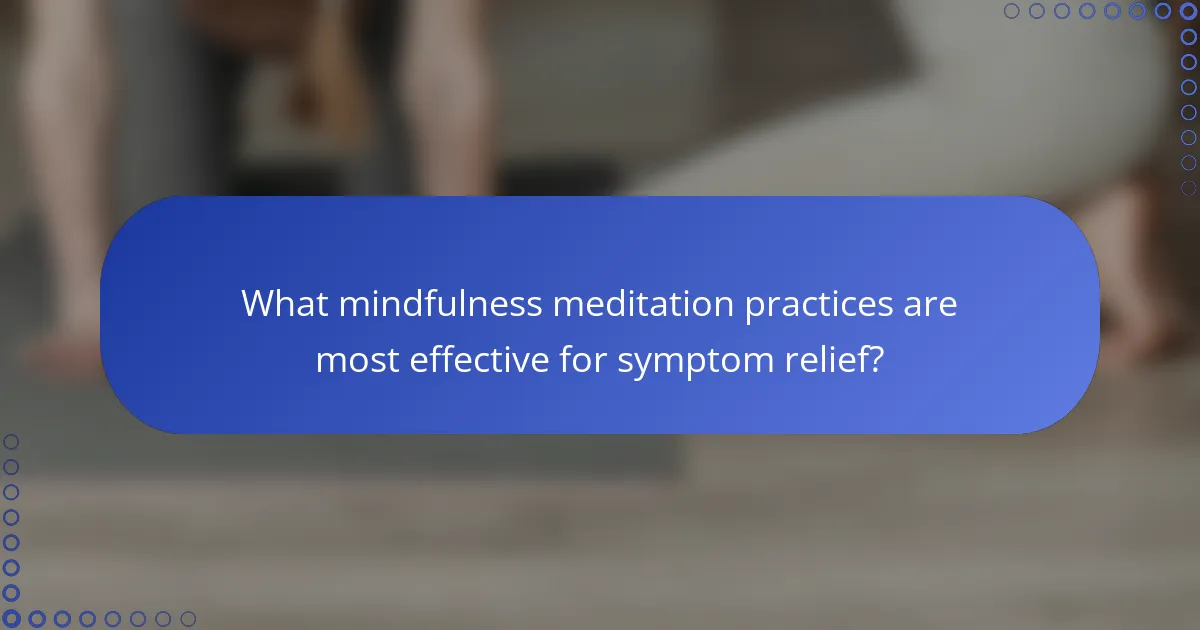
What mindfulness meditation practices are most effective for symptom relief?
Mindfulness meditation practices that focus on breath awareness and body scanning are most effective for symptom relief in rare diseases. These practices promote relaxation and reduce stress, which can alleviate symptoms. Evidence shows that regular engagement in mindfulness meditation enhances emotional regulation and physical well-being. For instance, studies indicate that participants experienced significant reductions in pain and anxiety levels after consistent practice. Additionally, incorporating guided imagery can further enhance the effectiveness of mindfulness meditation by fostering a positive mental state and improving overall quality of life.
Which techniques are recommended for beginners in mindfulness meditation?
Beginner-friendly mindfulness meditation techniques include focused breathing, body scan, and mindful walking. These practices help cultivate awareness and reduce stress.
Focused breathing involves concentrating on your breath, noticing inhalation and exhalation. Body scan encourages awareness of physical sensations from head to toe, promoting relaxation. Mindful walking combines movement with awareness, grounding you in the present moment. Each technique can be tailored to individual preferences and schedules, enhancing personal meditation journeys.
How can guided meditation sessions enhance the experience?
Guided meditation sessions can significantly enhance mindfulness meditation practices by providing structure and focus. These sessions often lead to deeper relaxation, allowing participants to better connect with their personal journeys. Research indicates that consistent practice can alleviate symptoms associated with rare diseases, improving overall well-being. Additionally, guided sessions can introduce techniques tailored to specific needs, enhancing the meditative experience.
What role do breathing exercises play in mindfulness practices?
Breathing exercises are fundamental to mindfulness practices as they enhance focus and relaxation. These exercises promote awareness of the present moment, reducing anxiety and stress. They also help regulate emotions, improving overall mental well-being. Regular practice can lead to measurable improvements in symptoms associated with rare diseases, such as chronic pain and fatigue.
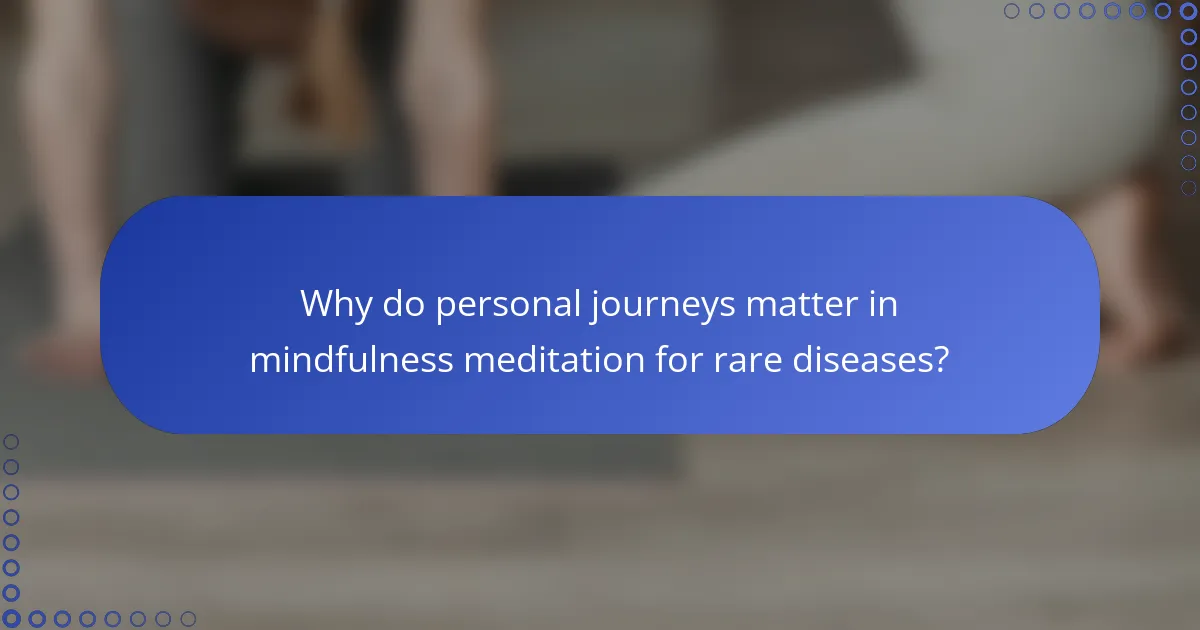
Why do personal journeys matter in mindfulness meditation for rare diseases?
Personal journeys are crucial in mindfulness meditation for rare diseases as they foster individual connection and tailored experiences. Each person’s unique narrative enhances engagement, allowing for deeper emotional processing and symptom management. Personal stories can inspire resilience, highlighting practical applications of mindfulness techniques. This individualized approach often leads to improved mental well-being and a sense of community among those facing similar challenges.
How can sharing personal experiences foster community support?
Sharing personal experiences in mindfulness meditation can significantly foster community support. By openly discussing journeys and impacts on rare disease symptoms, individuals create connections that enhance empathy and understanding.
These shared narratives can help others feel less isolated, as they find common ground in similar challenges. Additionally, communal practices, such as group meditation, can provide a supportive environment that encourages emotional healing and resilience.
Engagement in these discussions often leads to increased awareness and advocacy for rare diseases. As community members share their stories, they can inspire collective action, leading to better resources and support networks.
What are the common challenges faced by individuals practicing mindfulness meditation?
Individuals practicing mindfulness meditation often encounter several challenges. Common issues include difficulty maintaining focus, managing intrusive thoughts, and experiencing frustration with progress. Additionally, some may struggle with physical discomfort during sessions or find it hard to integrate mindfulness into daily life. These challenges can impact the overall effectiveness of mindfulness practices, especially for those seeking relief from rare disease symptoms.
How do personal stories influence the perception of mindfulness benefits?
Personal stories significantly enhance the perception of mindfulness benefits by providing relatable experiences. These narratives often illustrate how mindfulness meditation practices have transformed individual lives, particularly in managing rare disease symptoms. Personal accounts create emotional connections, making the abstract benefits of mindfulness more tangible. They highlight unique attributes, such as resilience and coping strategies, which resonate with others facing similar challenges. By sharing specific outcomes, such as reduced anxiety or improved quality of life, these stories foster a deeper understanding and acceptance of mindfulness practices.
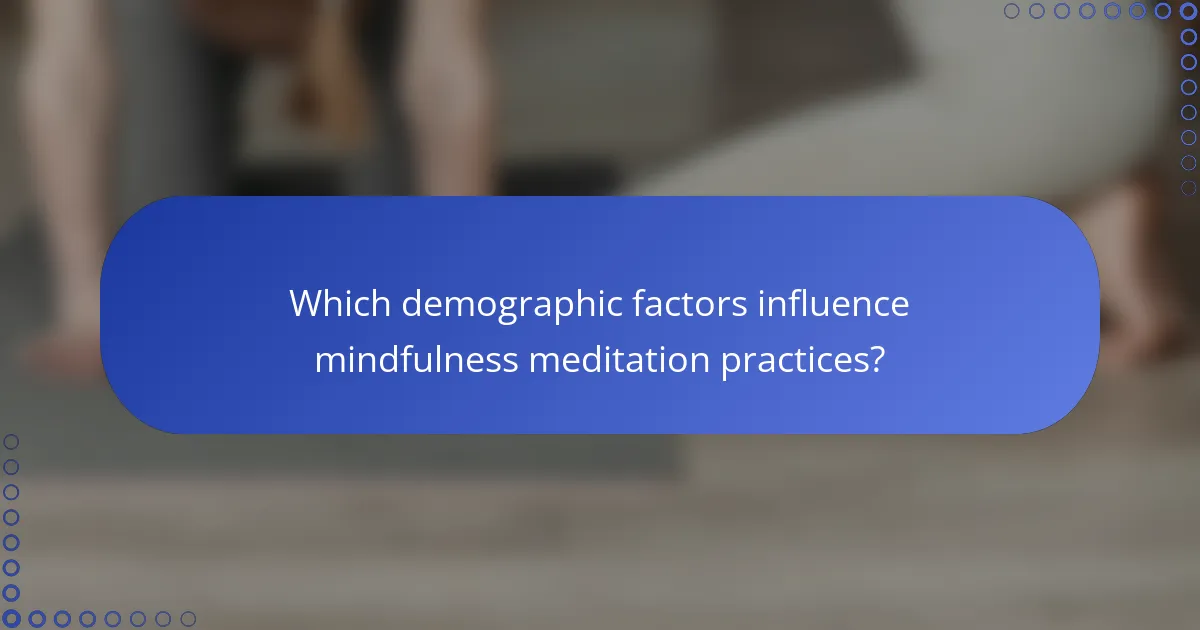
Which demographic factors influence mindfulness meditation practices?
Demographic factors such as age, gender, socioeconomic status, and cultural background significantly influence mindfulness meditation practices. Younger individuals often engage more with technology-driven mindfulness apps, while older adults may prefer traditional methods. Gender differences reveal that women generally report higher engagement in mindfulness practices. Socioeconomic status impacts access to resources, affecting participation levels. Cultural background shapes perceptions and practices of mindfulness, leading to diverse approaches. Understanding these factors can enhance tailored mindfulness programs, improving their effectiveness in managing rare disease symptoms.
How do cultural backgrounds shape mindfulness meditation approaches?
Cultural backgrounds significantly influence mindfulness meditation approaches by shaping practices, beliefs, and techniques. Different cultures integrate unique elements, such as rituals or philosophies, impacting personal journeys and symptom management in rare diseases. For instance, Eastern traditions often emphasize breath control and awareness, while Western adaptations may focus on cognitive techniques. This diversity enriches mindfulness practices, allowing individuals to tailor their experiences based on cultural context. As a result, practitioners can find approaches that resonate deeply, enhancing their ability to cope with symptoms effectively.
What age groups are most likely to engage in mindfulness meditation for health benefits?
Individuals aged 25 to 55 are most likely to engage in mindfulness meditation for health benefits. This age group often seeks stress reduction and improved mental well-being. Research indicates that adults in this range report significant improvements in managing symptoms of anxiety and depression through mindfulness practices. Additionally, younger adults, particularly those aged 18 to 24, are increasingly exploring mindfulness as part of holistic health approaches.
How does gender impact the effectiveness of mindfulness practices?
Gender can influence the effectiveness of mindfulness practices, with research indicating differences in response and engagement levels. Studies show that women often report greater emotional benefits from mindfulness, while men may focus more on cognitive aspects. Additionally, societal norms may shape how each gender approaches these practices, impacting their overall effectiveness. Understanding these differences can enhance personalized mindfulness strategies for individuals, particularly those managing rare disease symptoms.
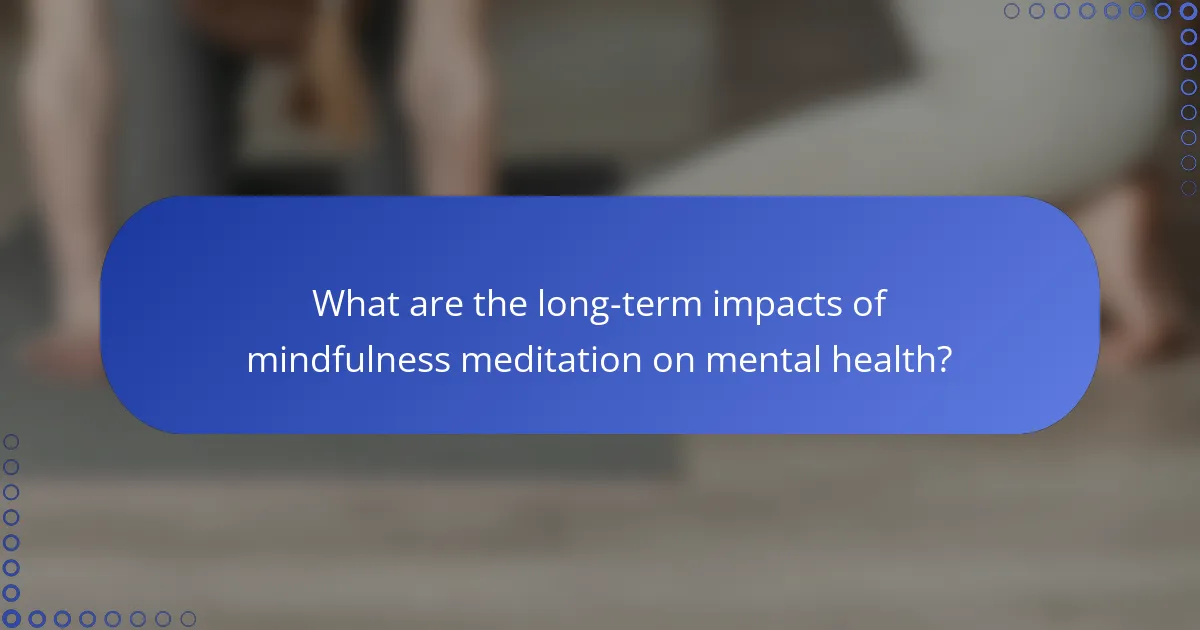
What are the long-term impacts of mindfulness meditation on mental health?
Mindfulness meditation has long-term positive impacts on mental health, including reduced anxiety and improved emotional regulation. Regular practice enhances self-awareness and resilience, leading to better stress management. Studies show that mindfulness can decrease symptoms of depression and improve overall well-being. Additionally, individuals with rare disease symptoms report benefits such as reduced pain perception and improved quality of life through mindfulness techniques.
How does regular practice affect stress levels in individuals with rare diseases?
Regular practice of mindfulness meditation can significantly reduce stress levels in individuals with rare diseases. This approach helps manage anxiety and enhances emotional regulation, leading to improved overall well-being. Studies show that consistent meditation can lower cortisol levels, a key stress hormone, thereby alleviating stress-related symptoms. Additionally, personal journeys of individuals reveal that mindfulness fosters resilience, enabling better coping mechanisms for the challenges posed by rare diseases.
What evidence supports the mental health benefits of mindfulness meditation?
Mindfulness meditation shows significant mental health benefits, supported by numerous studies. Research indicates that regular practice reduces symptoms of anxiety and depression, enhances emotional regulation, and improves overall well-being. For instance, a meta-analysis found that mindfulness meditation can decrease anxiety by up to 30%. Additionally, participants often report increased self-awareness and reduced stress levels. These findings highlight mindfulness meditation as a valuable tool for mental health improvement.
How can mindfulness meditation improve emotional resilience?
Mindfulness meditation significantly enhances emotional resilience by fostering awareness and acceptance of emotions. This practice helps individuals manage stress and anxiety, leading to improved coping mechanisms. Research indicates that regular mindfulness meditation can reduce symptoms of depression and anxiety, promoting emotional stability. Additionally, personal journeys reveal that those with rare diseases often find mindfulness techniques beneficial in managing emotional responses to their conditions. These practices cultivate a sense of control and well-being, which is crucial for emotional resilience.
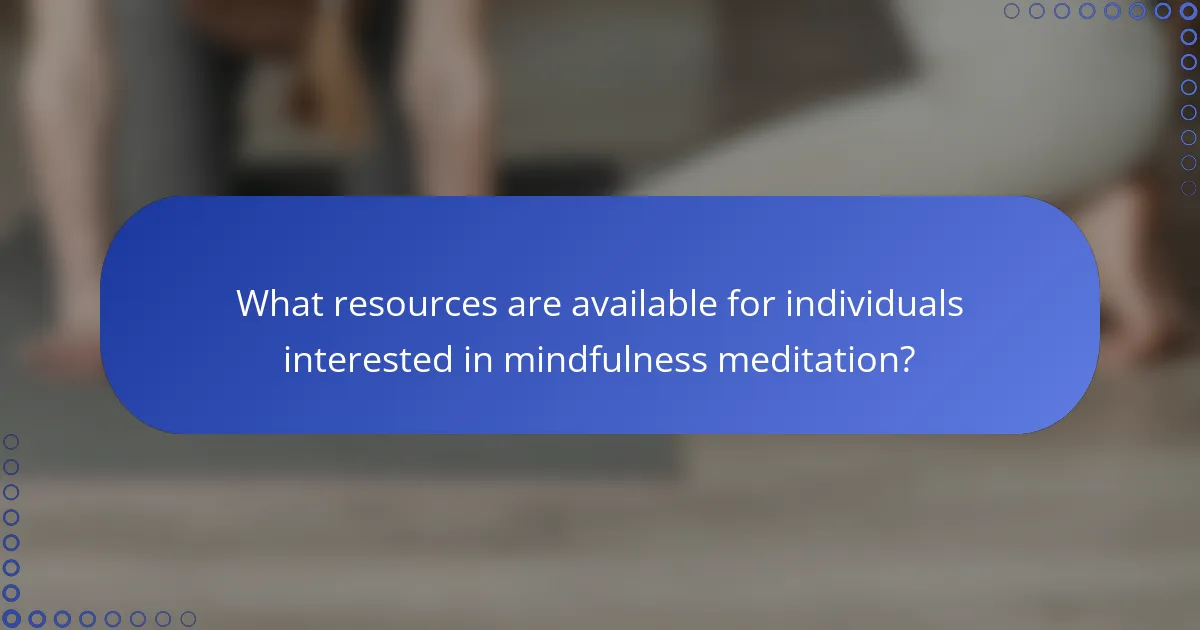
What resources are available for individuals interested in mindfulness meditation?
Numerous resources exist for individuals interested in mindfulness meditation. Online platforms offer guided sessions, such as Headspace and Calm, which provide structured programs. Local community centers often host classes led by experienced instructors. Books on mindfulness, like “The Miracle of Mindfulness” by Thich Nhat Hanh, serve as valuable guides. Additionally, research studies highlight mindfulness meditation’s potential impact on reducing symptoms of rare diseases, enhancing its significance for individuals seeking holistic health benefits.
Which online platforms offer guided mindfulness meditation?
Several online platforms offer guided mindfulness meditation, including Headspace, Calm, Insight Timer, and 10% Happier. These platforms provide various meditation styles tailored to personal journeys and symptom management for rare diseases. For example, Insight Timer features a community of teachers and diverse practices, while Calm emphasizes sleep and relaxation techniques. Each platform has unique attributes that cater to different user needs, enhancing mindfulness experiences.
What books or literature are recommended for understanding mindfulness meditation?
Recommended books for understanding mindfulness meditation include “The Miracle of Mindfulness” by Thich Nhat Hanh, “Wherever You Go, There You Are” by Jon Kabat-Zinn, and “Radical Acceptance” by Tara Brach. These texts explore mindfulness practices, personal journeys, and their impacts on well-being, including rare disease symptoms. Each book offers unique insights into integrating mindfulness into daily life and enhancing mental clarity.
How can local community centers support mindfulness practices?
Local community centers can significantly enhance mindfulness practices by providing accessible resources and supportive environments. They can offer guided meditation sessions, workshops, and classes tailored to individuals with rare diseases, helping them manage symptoms through mindfulness.
Community centers can also foster connections among participants, creating a sense of belonging that enhances personal journeys in mindfulness. By integrating mindfulness into their programs, these centers can improve mental well-being and resilience in individuals facing health challenges.
Additionally, community centers can collaborate with healthcare professionals to educate participants about the benefits of mindfulness meditation, promoting its role in symptom relief. Such initiatives contribute to a holistic approach to health, emphasizing the importance of mental and emotional support.
What expert tips can enhance the effectiveness of mindfulness meditation?
To enhance the effectiveness of mindfulness meditation, focus on consistency, environment, and intention. Establish a regular practice schedule to build discipline and familiarity. Create a calming and distraction-free space to foster deeper concentration. Set clear intentions for each session to guide your practice and enhance focus. Consider integrating breathwork to deepen relaxation and awareness. Engage in mindful observation of thoughts and feelings without judgment, allowing for greater self-awareness.